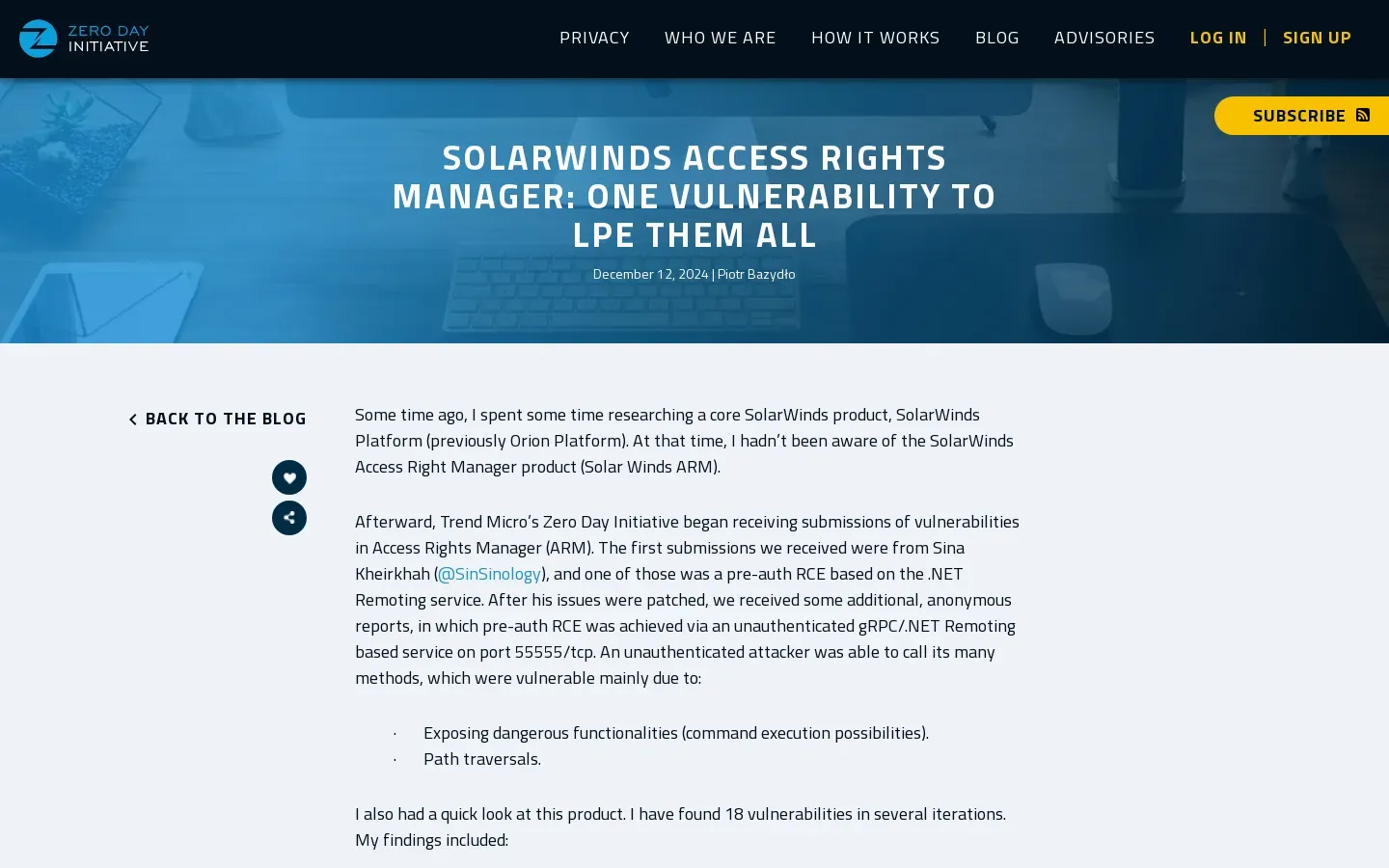
Critical Vulnerabilities Identified in SolarWinds Access Rights Manager
/ 4 min read
Quick take - Recent research has identified significant vulnerabilities in SolarWinds Access Rights Manager (ARM), highlighting the risks of privilege escalation and underscoring the need for organizations to implement security updates and enhance their cybersecurity measures.
Fast Facts
- Critical vulnerabilities in SolarWinds Access Rights Manager (ARM) have been identified, necessitating urgent security updates, particularly the ARM 2024.3 update.
- The research highlights significant risks related to privilege escalation, which could allow unauthorized access to sensitive systems and data.
- Emphasis is placed on the importance of secure coding practices and comprehensive vulnerability management strategies to mitigate risks.
- Organizations are encouraged to enhance incident response protocols and threat modeling frameworks in light of the identified vulnerabilities.
- Recommendations include adopting advanced vulnerability assessment tools, integrating incident response with threat intelligence, and developing secure coding guidelines for third-party software.
Critical Vulnerabilities Uncovered in SolarWinds Access Rights Manager: A Call to Action for Enhanced Cybersecurity
Recent research has brought to light significant vulnerabilities within the SolarWinds Access Rights Manager (ARM), urging organizations to swiftly implement security updates, particularly the ARM 2024.3 update. These findings underscore the pressing need for improved cybersecurity measures in enterprise environments, focusing on the risks associated with privilege escalation.
Overview of the Research
The investigation into SolarWinds ARM aimed to uncover vulnerabilities through a comprehensive approach involving vulnerability discovery, code review, exploit development, and impact analysis. The research highlights the potential for attackers to exploit these weaknesses, stressing the importance of timely patching and proactive security strategies.
Methodology
The research employed several key methodologies:
-
Vulnerability Discovery and Reporting Analysis: This phase involved identifying and cataloging security weaknesses within ARM.
-
Code Review and Static Analysis: Researchers conducted an in-depth examination of the ARM codebase to identify coding flaws that could be exploited.
-
Exploit Development and Testing: Exploits were developed and tested based on identified vulnerabilities, with a focus on local privilege escalation techniques.
-
Impact Analysis and Privilege Escalation Techniques: The study assessed the potential impact of successful exploitation, particularly concerning privilege escalation risks.
Key Findings
The research yielded several critical insights:
-
Awareness of Privilege Escalation Risks: The findings highlight the severe nature of privilege escalation vulnerabilities, which could grant unauthorized access to sensitive systems and data.
-
Secure Coding Practices: Emphasizing the necessity for developers to adopt secure coding practices to prevent vulnerabilities in software.
-
Comprehensive Vulnerability Management: Organizations must implement robust vulnerability management strategies to regularly assess and mitigate software risks.
-
Incident Response and Threat Modeling Implications: The identified vulnerabilities necessitate updates to incident response protocols and threat modeling frameworks.
Tools and Techniques Discussed
The research highlighted several tools and frameworks:
-
SolarWinds Access Rights Manager (ARM): The primary software examined for vulnerabilities.
-
CVE-2024-23474: A specific identifier for one of the critical vulnerabilities discovered.
-
File Deletion to Local Privilege Escalation (LPE) Technique: A method identified as particularly concerning due to its exploitation potential.
-
gRPC/.NET Remoting: Technologies associated with the vulnerabilities that require scrutiny.
Strengths and Limitations of the Research
The research’s strengths lie in its comprehensive approach to vulnerability assessment and practical implications. However, limitations exist in the scope of examined vulnerabilities, highlighting the need for further investigation into additional security measures.
Implications for the Cybersecurity Field
The implications extend beyond immediate security concerns:
-
Enhanced Vulnerability Assessment Tools: Organizations are encouraged to adopt advanced tools for vulnerability assessment to stay ahead of threats.
-
Security Best Practices Framework for Active Directory Management Tools: Advocating for tailored security frameworks for AD management tools.
-
Incident Response and Threat Intelligence Integration: Integrating incident response plans with threat intelligence is crucial for improved preparedness.
-
Training and Awareness Programs: Ongoing training is essential to equip personnel against evolving threats.
-
Secure Coding Guidelines for Third-Party Software: Establishing guidelines to promote secure coding practices among third-party developers is recommended.
Organizations utilizing SolarWinds Access Rights Manager should prioritize implementing the latest security updates while reassessing their cybersecurity strategies in light of these findings. Proactive measures, including adopting advanced vulnerability assessment tools and enhancing incident response protocols, are vital steps forward in safeguarding sensitive data against potential exploitation.



